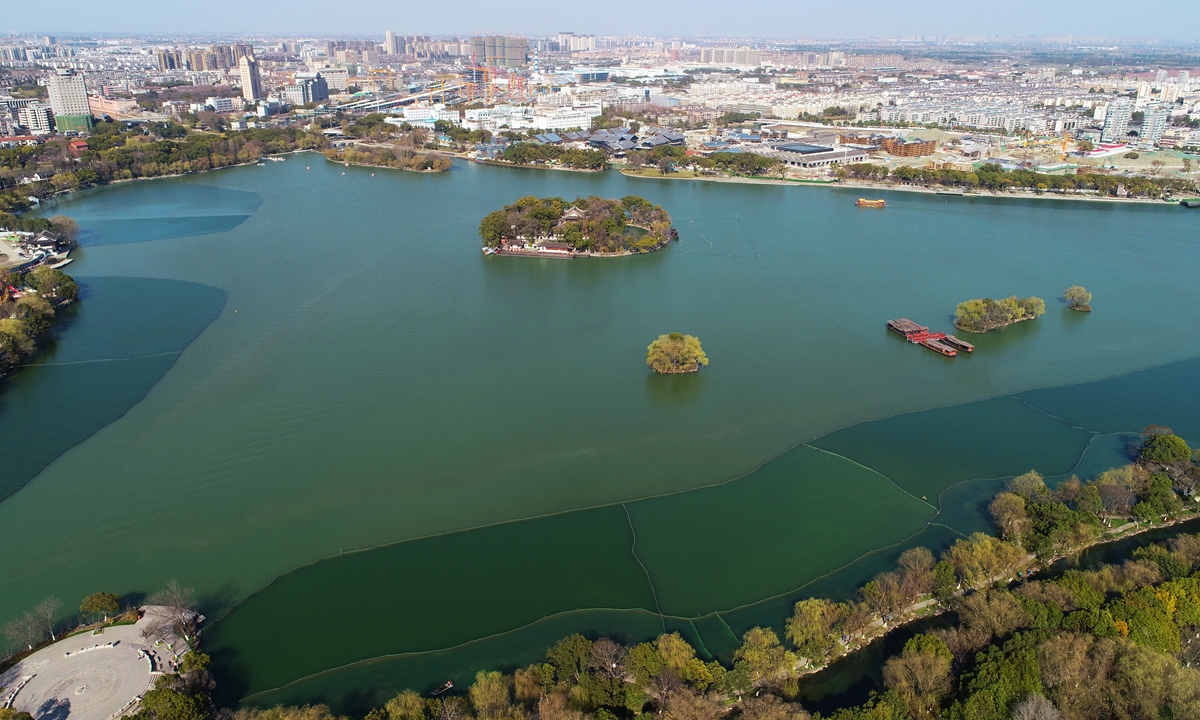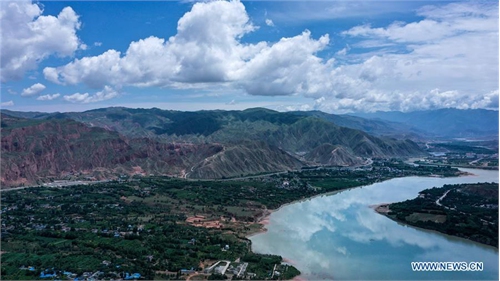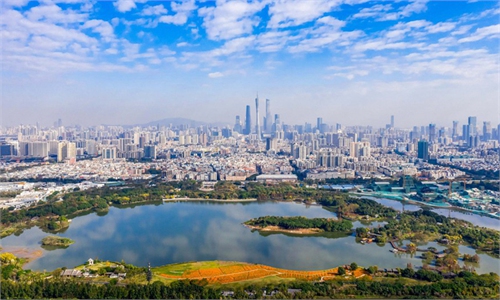Infrastructure giants seize business in ecological civilization buildup in China
Infrastructure giants seize business in ecological civilization buildup

An aerial photo shows how "underwater forest" helps purify the water of the Nanhu Lake in Jiaxing, East China's Zhejiang Province. File photo: Courtesy of CCCC
As the COVID-19 pandemic crippled international travel, a growing number of Chinese infrastructure companies are eyeing on projects related to the "Beautiful China" strategy, believing such projects possess huge potential given China's vast domestic market and growing domestic appetite for greenness and sustainability.
Joining the ranks are Chinese infrastructure giants including China Communications Construction Co (CCCC), China Railway Construction Corporation and China State Construction Engineering Corp, world-class companies traditionally famous for their ports and roads that have helped to reshape global trade routes and skyscrapers and stadiums that appear on hosting countries' currency notes and postcards.
In the Nanhu Lake in Jiaxing, East China's Zhejiang Province, CCCC undertook an environmental improvement of the lake measuring 0.52 square kilometers by planting an "underwater forest" to purify the lake's water, making it swimmable again.
The lake, upon which on a boat the founders of the Communist Party of China convened a historic meeting in 1921, has been a tourist attraction in recent years since "Red Tourism" gained popularity, making environmental improvement project to the polluted lake necessary.
In addition to planting underwater vegetation that absorb an excess of nutrients causing pollution, five tons of clams, shell life and prawns were dumped into the lake to help rebuild the ecosystem and extra sludge was dredged out of the lake.
Zhou Fei, a resident in Jiaxing and a hotel manager by profession, told the Global Times on Friday that the Nanhu Lake became polluted as the city became increasingly industrialized over the past decades.
"When we were kids, there were fish and shrimps in the lake, but the lake became polluted later," Zhou said. "Now we as citizens of the city are most glad to see the lake is becoming clean again."
"For our business, the amelioration of the lake is a big positive boost; and for our lives, I jog around the lake every day, the change is a blessing," said Zhou.
For China's infrastructure companies, they are thrilled that such environmental projects stood as a huge business opportunity to be explored. The potential projects ranged from environmental improvement for rivers and waterways to renovating a decayed village to ameliorate and operate parks.
The move came as Chinese leaders have repeatedly stressed that the government must take action to build a "Beautiful China, where the skies are blue, the land is green and water is clear."
It is estimated that industries in energy-saving and environmental protection sectors will have a combined output of 12.3 trillion yuan ($1.92 trillion) by 2023, according to an industry report by online information site qixin.com in April.
Experts have stated that as the environment improves, the surrounding land will often see a rise in its value and related business such as property, tourism and accommodation has a better chance of flourishing.
Big potential
As the domestic tourism market received extra booster effect due to the fact that Chinese tourists largely chose to stay away from global travel destinations, opportunities in such sectors are growing, industry insiders told the Global Times.
Cao Zheng, a manager at Shanghai-based SDC Orient Dredging Engineering Co, told the Global Times on Friday that the future infrastructure construction opportunities in China will be focused on rural areas, though that could be a different kind of infrastructure buildup.
"In Chinese cities, the infrastructure is already first-rated, with many cities possessing infrastructure projects on par with that of Japan or South Korea," Cao said. "For China, the wink infrastructure link is now in the rural areas. With more Chinese willing to spend more money on leisure, the market potential is huge."
Cao's company oversaw a rural revitalization project in a small village in Shanghai. They renovated an outdated village with whitewashed walls and black tiles, dredged the village's aged waterways and added several scenic bridges.
The village has since become a tourist attraction for city residents with hotel rate as high as 1,500 yuan per night during the weekend, greatly boosting the local's income.
Li Dalong, a Tianjin-based urban planner, told the Global Times that while a project such as renovating a park sounds trivial for outsiders, the market is actually huge.
Li's company invested 3 million yuan in Chengdu, Southwest China's Sichuan Province to remake a park at their own costs, and then operate the park for a certain period of years to generate incomes with some franchise rights such as advertising. Their company could operate the park better than administrators assigned by city governments, who are usually not business-savvy enough.
"When we completed the dredging and amelioration project for one park in Chengdu, local governments actually gave us an additional 10 parks to remake and operate," Li told the Global Times.
Sustainability targeted
Ma Yichao, a senior expert with Zhejiang Hehu Net, a website focusing on water-related ecological and economic issues said the beautification projects in China could bank on a great deal of environmental technologies imported from the West.
"It is very common that we will incorporate some of the leading technologies from foreign countries into our projects," Ma said.
"However, the endeavor can only be a Chinese thing, as Western countries don't face the same level of pressure from dense population as China does," noted Ma.
Both Germany and Japan had some experience in how to convert polluted environment back to greenness, but their experience is limited to the Chinese as their population density is much lower, Ma noted.
"Our foreign partners could not provide all the things we need, many of the issues are unique to China, and is best to be solved by ingenuity of Chinese engineers," Ma said.
Experts said although currently a large number of the projects are carried out by State-owned enterprises, private companies are expected to follow suit once they figured out a way to generate a profit from such projects.
Industry insiders warned that the current construction wave should not end up in a string of costly tourist sites at face value and that are not sustainable. Operating the site is even more important than building a site from perspective of sustainable development.




